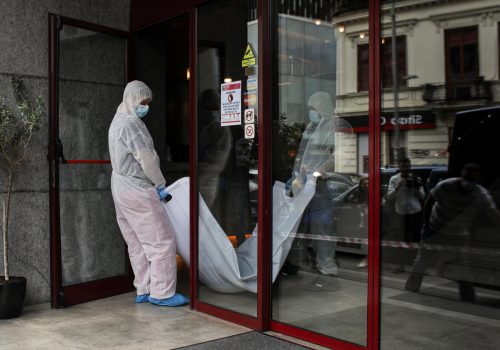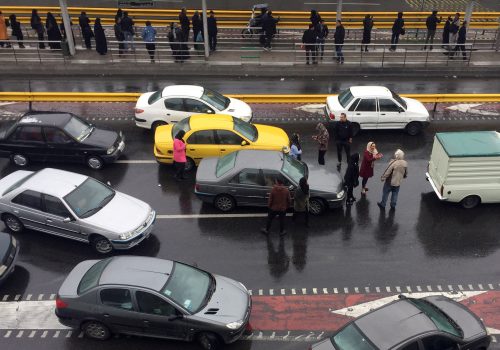The Iran terror trial verdict could forever change terror trials in Europe
The February verdict against an Iranian diplomat tried in a Belgian court for an act of terror committed in Europe will have long-standing implications for how terrorism-related offenses are investigated and adjudicated in European courts. The trial concerned the attempted bombing of a rally held by the Mujahedin-e Khalq (MEK)—an exiled leftist-Islamist political group that seeks regime change in Iran—which was attended by tens of thousands of people in Villepinte, near Paris, France on June 30, 2018. The diplomat in question was sentenced to twenty years in prison. The Belgian criminal justice system allows for simultaneous criminal and civil proceedings; the final judgment outlines both sentences and damages owed. The significance of the proceedings and the verdict stand to permanently change the way European law and member states investigate and try terrorism cases.
Facts of the case
The convicted perpetrator, Assadollah Assadi, was a diplomat stationed at the embassy of the Islamic Republic of Iran (IRI) in Vienna, Austria. He was arrested in Germany on July 1, 2018 on charges of plotting a terror attack, along with two of his accomplices: Amir Saadouni and Nasimeh Naami—a couple with dual Iranian and Belgian citizenship. Their car, carrying one pound worth of TATP—a volatile explosive substance—and a detonator, was stopped on the way from Belgium to France. The fourth defendant, Mehrdad Arefani, was an accomplice of Assadi and meant to guide the couple at the Villepinte rally.
French and Belgian intelligence confirmed that the couple and Assadi—who have known each other since at least 2015—were agents of the IRI, though they posed as members of the opposition. Assadi transported the explosives undetected on a Tehran to Vienna flight before driving to Luxembourg in a rented car, where the couple then took possession of the explosives. The large attendance of the meeting in Villepinte and the presence of several considerably influential political figures—including attorney Rudy Giuliani, former US congressman Newt Gingrich, former Canadian Prime Minister Stephen Harper, and former Colombian presidential candidate Ingrid Betancourt—means that the ramification of a successful bombing would have been significant.
The issue of diplomatic immunity
Via his attorney, Assadi argued that as a diplomat stationed in Austria, his immunity extended beyond the borders of Austria. As such, Assadi claimed that he could not be charged with a crime and, on this basis, he contested the very legitimacy of the proceedings, and refused to appear in court for both hearings in November and December 2020. Tehran supported Assadi’s position at the time of trial, adding that Iran would not accept the verdict. The defense team persisted in arguing the arrest was unlawful, yet Article 31 of the Vienna Convention on Diplomatic Relations (VCDR) does not extend the realm of immunity outside of the state that is receiving the member of the mission. The fact that Assadi was arrested in Germany while on vacation with his family and was tried in Belgium in conjunction with authorities in France meant that Assadi’s immunity could not stretch beyond the borders of Austria.
The court took into consideration the several arguments that were brought forward, including the input of Austria on their understanding of the immunity granted to Assadi within their borders under the VCDR. Evidence obtained by Belgian intelligence and disclosed during the trial demonstrated that the explosives were carried from Iran into Austria through luggage covered by diplomatic immunity, leading the court to note that, while diplomatic immunity served as cover to facilitate the transfer of explosives, it was also—ironically—proffered as a basis to dismiss the case.
The broader counter-terrorism context
According to the attorney for the National Council of Resistance of Iran (NCRI)—a political opposition coalition to the Islamic Republic whose main member is the MEK, which was hosting the rally—a fifth defendant should have been named in the complaint: the IRI. However, no corresponding legislation allows the federal prosecution in Belgium to prosecute the IRI itself for sponsoring terrorism. This is not the first time that the IRI committed, or attempted to commit, acts of terrorism on European soil through diplomatic channels. However, this attempted attack breaks new ground in that previous attacks by the IRI typically targeted dissidents alone, while this attack also extended to foreign politicians.
The ambitious thwarted plot in Villepinte in June 2018 expands the understanding of capabilities and aggression that the IRI can demonstrate in foreign territories. Iran’s decision to quash opposition located outside of its borders touches on the mandate of the counter-terrorism apparatus of the European Union (EU). This, in turn, involves intelligence sharing through the European Union Intelligence and Situation Centre and transnational judicial cooperation via the European Union Agency for Criminal Justice Cooperation.
An arrest such as this one—involving Germany, Belgium, France, and Luxembourg—shows that the circulation of explosive material within borders and communication between foreign agents will lead to them being prosecuted in the EU. At the same time the attack was due to take place, Iranian President Hassan Rouhani was visiting Europe and was reportedly furious over the arrests, which revealed criminal activity perpetrated on behalf of the IRI at a time when the EU was acting as a buffer between the United States and Iran in the context of the Joint Comprehensive Plan of Action, which the US withdrew from in May 2018.
Given that this attack did not come to fruition, the twenty year sentence given to Assadi and fifteen, seventeen, and eighteen year sentences for his accomplices are significant for an inchoate crime.
All civil parties—guests of the conference and the NCRI itself—requested damages, in the amount of one euro—as a symbolic damages award. This ask was intended to show that, while none of them suffered physical harm, the reality of a significant plot to commit a mass killing remains undeniable and has been supported by intelligence, including communications intelligence that illustrated the actual capacity to attack a location as large as the Villepinte venue. The judgement also orders for 200 euros to be deposited into the Belgian Victims and First Responders’ Fund, again acknowledging the strain on resources posed by preventing and answering to acts of terrorism.
The structure of said public funds varies from EU state to EU state and represents the increased number of attacks on the European continent since early 2015. As a result, the other defendants in the case—Naami, Saadouni, and Arefani—were also stripped of their Belgian citizenship under the argument that plotting a terrorist act was severe enough a crime to warrant the condemnation. This, however, does not necessarily lead to a removal of their right of residence.
As Belgium also finds itself in the throes of another terror trial—that of the 2016 bombings of the airport and subway in Brussels that the Islamic State of Iraq and al-Sham (ISIS) claimed responsibility for—several lawyers specialized in terrorism approach the issue of terror financing and terror support not just from a non-state armed group perspective, but from a more institutional and official framework—that of state-sponsored terrorism. The judgement delineates the scope of the indictment: Assadi and his accomplices were very much state agents, but it could not grant the prosecution’s request to declare Iranian intelligence and the intelligence ministry as a terror organization. Citing the precedent of the Mykonos restaurant attack in Berlin in 1992, the court found that it was short of the necessary statutes to try Assadi as an individual operating under cover of state business and for targeting nationals of that same state.
If it could be politically understood that Assadi was a proxy of Tehran, criminal law did not allow for an equivalent charge. The connection between the use of diplomatic immunity for the purpose of perpetrating an act of terrorism is substantial, but is not that direct. As of 2021, there is no legislation across any member of the twenty-seven EU states that allows for suing a state for terrorism and financial compensation for victims, despite the significant interest that would lie within it and the coherence it would present with several UN-based initiatives on stopping the flow of equipment, funds, and asylum for foreign fighters by holding states responsible. In its judgment, the court took very public note that Iran did not distance itself from the actions of the defendant, thereby inferring state responsibility. The ramifications could and should lead to policy change.
Assadi and his co-defendants appealed their conviction on March 8. On May 5, Assadi appeared before the court of appeal, and was denied any possibility of acquittal or even early release. The argument of diplomatic immunity was once again rejected. The court also supported the position of the court at trial that the foiled attack constituted state-sponsored terrorism, a decision that the NCRI’s attorney believes creates precedent for future similar trials in the EU. Assadi, who has already served three and half years’ imprisonment, will serve the full remaining sentence in Belgium. His co-defendants’ appeal will be heard in June.
Sarah Kay is an international human rights lawyer specializing in counter-terrorism and broader national security issues. She is currently undertaking research at Queen’s University Belfast, Northern Ireland.

The Atlantic Council’s Strategic Litigation Project injects fresh thinking into how governments and practitioners can apply legal tools to advance human rights and democracy around the world.
Image: Police officers stand guard before a trial of Iranian diplomat Assadollah Assadi, charged in Belgium with planning to bomb a meeting of an exiled Iranian opposition group in France, at the entrance to the court building in Antwerp, Belgium November 27, 2020. REUTERS/Johanna Geron


